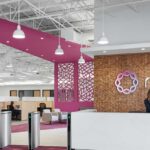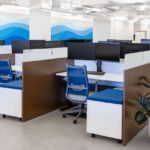The majority generation in offices today is millennials, and that means offices are quickly evolving to accommodate their tastes in order to attract this new generation of talent.

Born after 1980, millennials value flexibility in the jobs they take on, meaningful work (money isn’t the sole motivating factor for which jobs they’ll take), and dislike rigorous hiring processes, corporate buzzwords, and a lack of feedback in the workplace.
From Inc.com:
Millennials basically relaunched the concept of the open office and their desire for light, minimal and fun spaces has been tarnished by the “ugh, ping pong tables?” think pieces in media. But Millennials can encourage work-centric Boomers to take breaks, give positive feedback to Gen Xer’s leadership, and will happily tweet about their work experience to build the brand. They are team players who are introducing equity as a higher standard of equality. They’ll love communal work tables, bright and bold offices, and conference rooms that break the mold.
Millennials have a number of values that affect how they work:
- Work-life balance: millennials care about having a good work-life balance.
- Comfort in the office: millennials care about comfort and convenience in the office. This tends to add requirements to businesses wanting to recruit millennials, but it can also mean flexibility in how millennial workers will feel comfortable engaging.
- Openness to new ideas: millennials are generally not bound by old ways of doing things. That means they’ll accidentally re-invent known ways of doing things from time to time, but it also means innovation.
Millennials have a number of traits which directly impact office design:
- Flexible work zones: some offices simply don’t have assigned seats. In offices where this isn’t feasible (most offices, actually), this can manifest in areas that are set up for general purposes or with a certain number of non-assigned desks or rooms for a specific purpose. For example, some workstations might be designed for video, but without specific assigned seats.
- Collaborative working environments – millennials don’t expect the same level of privacy as previous generations. Open concept offices are more common in businesses which are majority-millennial.
- Flexibility and modularity: sme offices have layouts which can be physically moved around to create smaller and larger team-based and pod-based workspaces as necessary
- Common areas: millennials expect to collaborate in areas that aren’t conference rooms. Mixed-use common areas and break are ideal for the sort of collaboartion that millennials like.



Leave a Reply